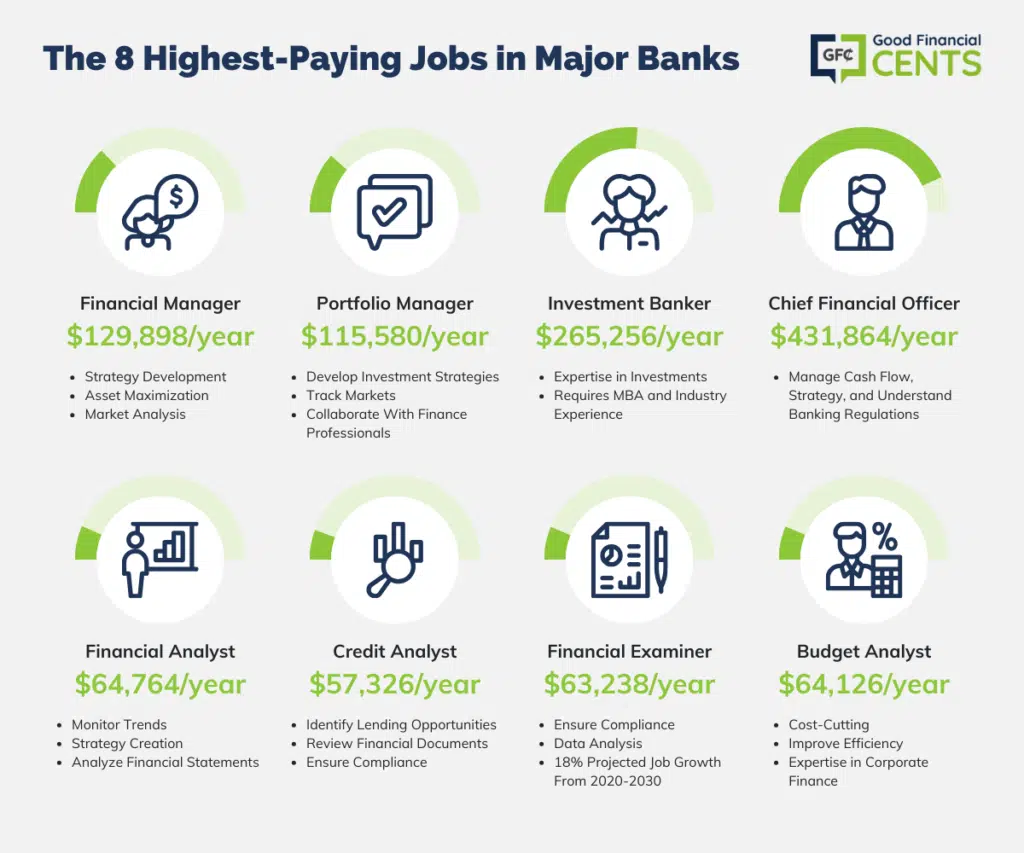A career in a major bank can be both rewarding and well-paying, with top positions garnering income of hundreds of thousands or even millions of dollars annually. But what exactly do these high-earning professionals do? And how much money do they make? Here are the highest-paying jobs in major banks for 2024.
A career in a major bank can be both rewarding and well-paying, with top positions garnering income of hundreds of thousands or even millions of dollars annually.
For example, investment bankers are near the top of the list, often working for large investment banks like Goldman Sachs or Morgan Stanley. But what exactly do these high-earning professionals do? And how much money do they make?
To help answer these questions, I’ve created a list of the highest-paying jobs in major banks. You can find these jobs in financial institutions such as banks, investment banks, hedge funds, and private equity firms.
I’ll also provide an overview of salary ranges and how to find a job in this field.
About the Banking Industry
The banking industry includes banks, investment banks, commercial banking, personal banking, hedge funds, financial planning, and private equity firms. These institutions vary significantly in terms of size and services offered.
Whether you’re a recent graduate or an experienced professional, the banking industry offers a diverse range of career opportunities. Some jobs require higher education and expertise, but many entry-level positions don’t require previous experience.
How Much Can I Expect to Earn Working at a Major Bank?
According to Payscale.com, the average annual salary in the banking industry is an impressive $82,758 annually. Entry-level positions can start around $51,688 per year, with more experienced staff making upwards of $131,977 a year, but the income range highlights the potential for career development.
According to the Bureau of Labor Statistics, finance-related jobs are predicted to experience a 7% annual growth rate until at least 2030.
According to the Bureau of Labor Statistics, finance-related jobs are predicted to experience an 8% annual growth rate until at least 2031 – in line with other professional sectors. At this rate, there will be an additional 980,200 new jobs within this field each year, presenting countless opportunities for professionals already in the sector.
Pursuing a career in banking is often worth the effort, with higher salaries and more job security available than in many other industries. The annual income can be substantially higher than similar occupations while providing stability and satisfaction.
Although many jobs may require longer hours, the results can be worthwhile.
The 8 Highest-Paying Jobs in Major Banks
1. Financial Manager
Average Salary: 129,898 per year
Financial managers are the captains of the financial industry, mapping out the course for a company’s future and guiding it through tough economic times. These individuals are essential to major banks worldwide, devising strategies to maximize assets while ensuring sound financial decisions are being made.
Through careful research and analysis of market data and other financial documents, financial managers identify opportunities for cost savings and recommend budgeting changes to help their businesses prosper. Because of this crucial role, financial managers command top dollar in big banks.
2. Portfolio Manager
Average Salary: $115,580 per year
A Portfolio Manager has the potential to earn an impressive salary – the average around $131,710 per year – however, they must display a high level of expertise, exercise sound judgment, and possess strong analytical skills to be successful.
Portfolio Managers are responsible for developing investment strategies, tracking markets, evaluating documents and figures, and creating customer investment plans. They also collaborate with other finance professionals, like investment bankers and credit analysts, to develop various growth strategies.
3. Investment Banker
Average Salary: $265,256 per year
Investment bankers are paid big bucks for their expertise and know-how. They possess a wealth of knowledge related to investments and markets that can help bring big returns. Investment bankers often possess an MBA and years of industry experience.
If you’re willing to put in the time and effort into acquiring the skills necessary and have an excellent understanding of financial markets, a career as an investment banker might be worth considering.
4. Chief Financial Officer
Average Salary: $431,864 per year
Individuals who excel in the Chief Financial Officer (CFO) role are highly sought after. Previous experience working in upper leadership roles or managing the financial duties of an organization provides the skills and knowledge to take on this role.
Because CFOs manage an organization’s cash flow, financial planning, and strategic direction, they are well compensated.
Becoming a bank CFO is no small task; it requires training, experience, and an understanding of the complexities of banking regulations. However, with job growth projected at 7% between 2020 and 2030, CFOs can enjoy a competitive salary with rewarding opportunities for career advancement.
5. Financial Analyst
Average Salary: $64,764 per year
Being a financial analyst at a bank requires more than just crunching numbers. Analysts use their skills to monitor trends, assess risks, create strategies, and recommend investment opportunities.
Financial analysts ensure banks make sound decisions in accordance with regulations and long-term goals, evaluating data and analyzing financial statements to gauge overall performance.
They must also stay current with market changes and emerging technologies that can alter the finance landscape.
Successful financial analysts can expect generous rewards from their employers in return for their expertise. Not only is becoming a financial analyst a high-paying job, but it’s also an opportunity for them to make a real difference in the lives of others through responsible investments.
6. Credit Analyst
Average Salary: $57,326 per year
Skilled credit analysts are highly coveted by their employers because they can identify lending opportunities and advise on suitable credit policies. To be eligible, one must have an eye for detail and the ability to review financial documents to assess whether loan applicants can repay their loans on time.
Credit analysts’ challenge is largely based on their ability to remain impartial when evaluating borrowers’ finances. They must make decisions with the utmost accuracy and integrity to ensure compliance with banking regulations and protect the financial institution from costly legal or financial repercussions.
Credit analysts must stay up-to-date with new developments in lending and assess whether loan applicants are using appropriate strategies when it comes to their finances.
7. Financial Examiner
Average Salary: $63,238 per year
It takes a special skillset to become a financial examiner. You may require a bachelor’s degree, and you must be able to analyze complex data and spot errors.
With 70,800 positions in 2020 and an 18% projected job growth between 2020-2030, it’s an attractive option for those who want to get into finance with the potential of making up to six figures in salary.
Financial examiners are essential in ensuring bank transactions comply with industry regulations.
They must analyze large amounts of data and travel to bank locations for on-site examinations. The job requires technical expertise and meticulous attention to detail.
Financial examiners can make a good living by ensuring customers receive the best banking experience. If you have the qualifications and desire to enter this field, now is a great time to pursue your goals – it’s one of the highest-paying jobs in the banking industry.
8. Budget Analyst
Average Salary: $64,126 per year
Budget analysts fill an essential role in the banking world. They are tasked with finding creative solutions to cut costs and improve operating efficiency. Budget analysts must also understand the ins and outs of corporate finance and be able to work with large amounts of data.
The role commands a high income and requires expertise and experience in the field.

Who Are the Major Banks?
Major or national banks tend to be well-capitalized and financially sound. They offer various financial solutions, including day-to-day banking, investment, and lending products and services.
Boasting powerful operational capabilities and, in many cases, a worldwide presence, these banks are renowned for their ability to generate considerable amounts of capital. Several are familiar household names: Citibank, Bank of America, Wells Fargo, and JP Morgan Chase are good examples of major banks.
Major Bank Careers: Key Qualifications
While the skills necessary to work in banking will differ depending on what career you pursue, there are a few key abilities that can be beneficial for all roles. Generally speaking, it would be advantageous to have the following:
- Sound knowledge of financial markets and investments
- Understanding of financial regulations and laws
- Excellent communication and interpersonal skills
- Detail-oriented, analytical mindset.
- The ability to work well under pressure
- Strong critical thinking and problem-solving capabilities.
- Knowledge of financial software applications and financial modeling.
How to Find the Highest Paying Jobs in Major Banks
Though banking professionals are often well compensated, precise salary figures will differ from one financial institution to another. But how do you go about finding the highest-paying financial positions in banking?
Here are some tips that can help:
Broaden Your Network

To find the best jobs in banking, it’s important to build relationships with financial professionals and recruiters, who can provide invaluable insight into compensation trends and career paths. Networking is a great way to get your foot in the door and showcase your financial skillset.
Incredibly, a staggering 85% of jobs are sourced through networking, so it pays to take the time and effort to build relationships with financial experts.
Networking with active employees in your desired bank can help you prepare for an interview and understand the financial institution’s culture.
Create a Strong Resume

It’s a competitive job market, and your resume is a key part of the hiring process. Make sure it’s tailored to each position, lists relevant qualifications, and avoids typos or errors.
Furthermore, remember that your interviewer may not spend much time reading your resume. Employers typically spend only 6-7 seconds skimming a resume, so make sure yours stands out!
Search for Job Openings on Bank Websites and Job Search Sites

When searching for a banking job, start your search by visiting bank websites and job listing sites. Of course, don’t forget to read through each posting in detail – particularly their pay levels and qualifications – so that you can determine if this is an opportunity worth pursuing.
Lastly, take the time to determine which type of financial banking career aligns with your skillset and experience. This will allow you to maximize your job search and increase your chances of landing a high-paying role.
Hone Your Skills in the Financial Sector to Gain Invaluable Experience

Sharpen your skills by taking classes or earning industry certifications to stay ahead of the game; also, stay on top of all industry news and trends.
Bottom Line – The 8 Highest-Paying Jobs in Major Banks for 2024
In 2024, the banking sector continues to provide lucrative opportunities for professionals aiming for high-earning roles.
From Financial Managers to Budget Analysts, these positions offer competitive salaries, reflecting the significance and responsibility of their functions.
As the finance sector is projected to grow annually, opportunities abound for those with the right skill sets.
Major banks, with their vast operational capabilities, stand as beacons of these opportunities. Whether you’re a seasoned professional or just starting, the banking world requires a blend of financial acumen, strong communication, and analytical prowess.
To capitalize on these opportunities, building a strong network, crafting an impeccable resume, and continuous skill development remain paramount.
Your Banking Career Awaits
If you’re looking for a job that pays well and offers plenty of opportunities for growth, you might want to consider working for a major bank. With the right skills and knowledge, a career in banking can be immensely rewarding.
Start your journey by networking with industry professionals, keeping up with the latest financial news, and updating your resume. Doing so can ensure you’ll be one step ahead of the competition.








